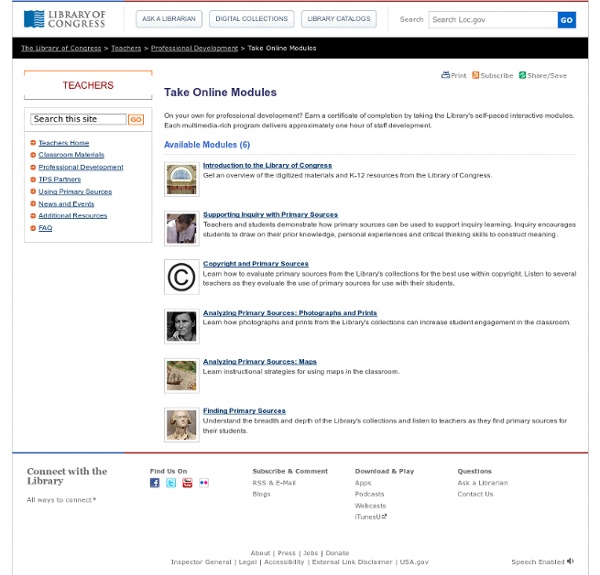Take Online Modules - For Teachers
On your own for professional development? Earn a certificate of completion by taking the Library's self-paced interactive modules. Each multimedia-rich program delivers approximately one hour of staff development. Introduction to the Library of CongressGet an overview of the digitized materials and K-12 resources from the Library of Congress. Supporting Inquiry with Primary Sources Teachers and students demonstrate how primary sources can be used to support inquiry learning. Copyright and Primary SourcesLearn how to evaluate primary sources from the Library's collections for the best use within copyright. Analyzing Primary Sources: Photographs and PrintsLearn how photographs and prints from the Library's collections can increase student engagement in the classroom. Analyzing Primary Sources: MapsLearn instructional strategies for using maps in the classroom.
3 Excellent How-to-Video Websites for Teachers
Are you looking for how to videos ? Here are some recommendations for you. We have reviewed three awesome web tools that you can use to search for and find instructional videos to use with your students in the classroom. One of these web services can even be used to create your own how to videos and share them with others. Check out the tools below and as usual don't forget to share with us your suggestions, comments, or additions . 1- Tildee Tildee is a free tool to help you create and share instantly and easily tutorials on any subject With a clear and user friendly interface, you go straight to the point: write your own tutorial. 2- Instructables Instructables is a web-based documentation platform where passionate people share what they do and how they do it, and learn from and collaborate with others 3- How Stuff Works
Lesson Plans – Search Education – Google
Picking the right search terms Beginner Pick the best words to use in academic searching, whether students are beginning with a full question or a topic of just a few words. View lesson Advanced Explore "firm" and "soft" search terms, and practice using context terms to locate subject-specific collections of information on the web. Understanding search results Learn about the different parts of the results page, and about how to evaluate individual results based on cues like web addresses and snippets. Engage additional search strategies, such as generalization and specialization. Narrowing a search to get the best results Apply filtering tools and basic "operators" to narrow search results. Compare results for basic searches with ones that use operators to discover the impact the right operator has at the right time. Searching for evidence for research tasks Evaluating credibility of sources Consider, tone, style, audience, and purpose to determine the credibility of a source. Culture Culture
Related:
Related:



